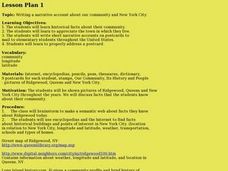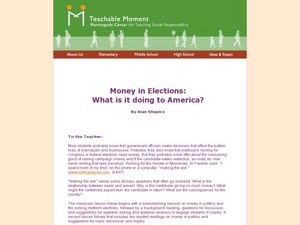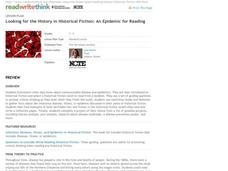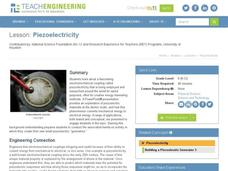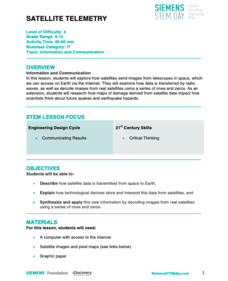Curated OER
Making a Travel Brochure
Third graders research the cities in Florida and discuss information about that city. In this travel brochure lesson, 3rd graders develop a list of attractions, slogan, and find facts about the city they are studying. ...
Curated OER
Our community and New York City
Fourth graders research websites to gather information about New York City and the Ridgewood community. In this New York City and Community lesson plan, 4th graders make a semantic map. Students write short postcards to send to...
Curated OER
PHYSICS LESSONS
Young scholars study the concept of electricity, what an electric current is and its relationship between voltage and resistance.In this electrical lesson students solve problems using Ohm's law, and research alternative sources of...
Curated OER
Money in Elections:What is it Doing to America?
Students investigate the role of money in American elections. In this current events lesson, students read and discuss articles that address money and political campaigns. Students may conduct further research on the topics presented in...
Curated OER
Kids' Newsbreaks
Group learners together to identify a question relating to an issue and create a 60-second kids news break highlighting information that begins to answer the question. They research and answer issue questions in a news story format.
Curated OER
Design Your Perfect Career
Young scholars incorporate the design process to create their own perfect job or career. In this career design lesson, students develop questions to research for a future career choice. Young scholars brainstorm about their personal...
Curated OER
Nonfiction Genre Mini-Unit: Persuasive Writing
Should primary graders have their own computers? Should animals be kept in captivity? Young writers learn how to develop and support a claim in this short unit on persuasive writing.
Bantam Books
The Martian Chronicles: K-W-H-L Activity
Prepare your class for a unit on Ray Bradbury's The Martian Chronicles with an activity that works for pre-reading, during reading, and post-reading. Learners fill out a K-W-H-L chart to reflect on what they already know, what...
Curated OER
The Tempest: The K-W-H-L Strategy
What does your class want to know about William Shakespeare's The Tempest? Host a discussion about the questions high schoolers have about the play with a KWHL activity in which they write down their inquiries, what they...
Novelinks
Words By Heart: K-W-H-L Strategy
How can we heal our hearts through forgiveness? The third activity in a series of six prompts readers to answer questions about Words by Heart by Ouida Sebestyen. Not only does it activate background knowledge on the...
Scholastic
Reading Symbols
Philip Pullman's The Golden Compass serves as the anchor text for a lesson on symbolism. Readers use the provided worksheets to examine the symbols in the novel as well as in the world around them.
ReadWriteThink
Looking for the History in Historical Fiction: An Epidemic for Reading
Combine informational reading skills with fictional text in an innovative historical fiction lessons. After reading a fictional text related to diseases, class members read non-fictional text to gain knowledge about specific infectious...
Tech Museum of Innovation
Analogous Models
What goes into a museum display? A secondary-level STEM project prompts groups to design a museum display for the Tech Museum of Innovation. They create an analogous, interactive model illustrating a science concept to complete the...
EngageNY
Mid-Unit 3 Assessment, Part II: Organizing Notes for a Public Speech
It's all a matter of opinion! Pupils take Part II of the mid-unit assessment, in which they continue organizing their notes in preparation for writing an opinion speech. Using the resource, they add reasons, evidence, and a concluding...
Museum of Tolerance
Family Tree Activity
Discover the family histories that make the classroom with a family tree activity. Scholars locate information about their family, construct a family tree, and work together to tally where family members are born.
Seussville
What Can Your Class Do?
Inspire scholars to do their part for planet Earth with a read-aloud of Dr. Seuss's The Lorax, and variety of activities designed to boost the environmental activist in us all. Activities include writing poems about the Earth,...
Teach Engineering
Piezoelectricity
What effect makes children's shoes light up? Answer: Piezoelectric effect. Here is a PowerPoint presentation that describes piezoelectric materials as being able to convert mechanical energy to electrical energy. Individuals learn how...
Virginia Department of Education
Scientific Notation
Writing a number is all in the notation. The resource introduces the class to scientific notation. Pupils learn the process of taking a very large or small number in standard form and write it in scientific notation. To practice,...
Discovery Education
Satellite Telemetry
Satellites require rockets to launch, but it doesn't take a rocket scientist to understand them. Future engineers learn about how satellites send data to Earth and how to interpret satellite images. They see how radio waves play a role...
BioEd Online
Muscles and Bones in Space
Being an astronaut takes not only high mental acuity, but also a high level of physical fitness, especially for those who spend a long amount of time away from Earth, such as the astronauts serving on the International Space Station....
Polar Trec
Where is the World's Water?
Scholars discover the amount of the Earth's water in various locations such as the ocean, ice, the atmosphere, etc. They then make a model of the how much water those percentages represent. Finally, analysis questions bring the concepts...
Newseum
Slanted Facts and Slippery Numbers
The Internet is known as the information superhighway, but sometimes it's hard to know when to hit the brakes on unreliable sources. Using a well-rounded lesson plan, pupils read and summarize articles about the gender pay gap and...
Curated OER
Alaska's Current Issues
Students work in small groups to brainstorm a list of issues in Alaska. As a class, they discuss their concerns. Students place their issues in two lists, those that are in the domain of the local and state governments, and those that...
Curated OER
Locating, Organizing, And Using Information
Students develop a topic to conduct research. They formulate questions about it and use a graphic organizer for categorizing information. Students use the information to generate a thesis to narrow the focus of the paper. They write a...

